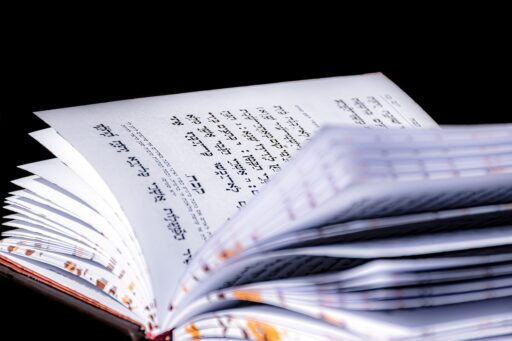I only say that word in shul (synagogue) and in the classroom.
They laughed, the dozen poets—Jewish poets—gathered outdoors on a lovely Saturday morning for a contemplative Shabbat service. But my joke, is it true? Definitely in the classroom, though I’m retired now and have fewer opportunities to startle students awake. But in shul?
*
What’s the weight of prayer? Returning a container loaded with twenty-five copies of Mishkan T’filah: A Reform Siddur for Shabbat, I found out. I had borrowed the prayer books from Congregation Beth Ha Tephila, the Reform congregation in Asheville, to use at the Friday night Kabbalat Shabbat service I co-led at Yetzirah’s first annual conference for Jewish poets. Lift, lower back spasm, drop. In the Temple’s parking lot, I said the word.
I live in two languages: sacred and profane.
*
What do they think of me, the core group of worshippers at Congregation Beth Israel, the independent conservative shul to which I belong, when, once a month, I lead an alternative contemplative Shabbat service in the small chapel while they davven(pray) the traditional service in the main sanctuary? I join them when I finish leading our group in chanting, meditating, and reflection. Instead of a prayerbook, we use a handout, twelve pages with thirty chants from which to choose. That’s the handout we used at the Yetzirah service. Is our service lighter, less serious, less meaningful, less faithful than the traditional service?
*
…I have the prayers in the book, and once again I have lost my place
When Dan Bellm read “Counting,” the title poem from his new book, at the Yetzirah conference, I thought, I know him! He’s a wandering Jew! A Jew whose mind, that is, wanders during prayer. We’re members of the same tribe! Halleluyah!
*
I start transgressing right after Yom Kippur, the Day of Atonement, I told the poets who joined me on the final day of the conference for the alternative Shabbat morning service. That way, I said, I’ll have plenty to atone for next Rosh Hashanah and Yom Kippur.
I live in two motions: wander and return.
*
In “Counting,” Bellm laments his failing efforts to sustain his attention on the prayers.
…once again I have lost my place, dreaming even past the prayer that calls on me to listen up; must I start it all over, and where would I begin; how far into the past would I unwind, how far would a self have to cast itself out before it flew beyond its reaches, to live, instead of being only lived in; oh it’s like asking to stop breathing; in the time I’ve spent worrying the sun turned all to shadow, it began to rain, the scent of the mown grass lifted into the trees, and now the light and shade have returned to their places a little further on, in accordance with the number of moments that have passed.
The rabbis bring him back, not to the right page but to reports, recorded in the Talmud, of their own difficulties with prayer.
Rabbi Hiyyah, called the Great, once said, I have never in my life prayed with
intention.
One time I tried to intend, but only wondered in my heart whether I would be
received
before the king, or sent into exile. How was I to know? This, of course,
started the other
rabbis talking; Rabbi Samuel admitted, with a shrug, I have been counting
chickens; Rabbi
Bun the son of Hiyyah said, I have been counting the layers of stone in the
wall, and his eyes lit up
with this woeful confession; Rabbi Mattaniah sighed, since there is always one
who feels responsible
for the prayers of all the rest, Then let there be blessings on our heads;for I
have noticed that whenever we come
to the last of the benedictions, at which we are commanded to bow down, our
heads are bowed of their own accord.
If only I counted chickens or the bricks of which the walls of our sanctuary are built! If only my attention wandered to “the scent of the mown grass lift[ing] into the trees”. Instead, when I could be listening to the prayers I’m mouthing in the sanctuary, I am caught in a net of stories as with haughty eyes I look at one congregant after another.
O, chattering, judgmental, impure mind.
*
Bellm’s poem brings me back.
But look, I must have nodded off again, enumerating, losing track of what
I meant to praise, drool on my shirt, or
else have had a dream, with none to interpret it; will You not look away
from me awhile, as Job cried out, and let me be,
whilst I swallow my own spit?
Drool, spit, You (God), Job: all there with Bellm in the sanctuary. Bellm wants God to look away but only for a moment, not forever.
…Return to me, O God, and I’ll return… …let me count the threads of You that I might tug at, complicated by being many, simple by being one…
The poem begins with a kavanah, an expression of the worshiper’s intention or aspiration as he begins to pray.
What if I this moment were only prayer, not a thought or word of one, not even an intention; sunlight on grass, nothing of itself but what it shows, or a bird that has called out, filled with purest hearing…
It concludes with a slight but significant modification of his original intention.
let me count the threads of You…
…
…if not to arrive at wanting nothing which is another desire then to
yearn for what is given, including the dust and the ash, and the last moment
You have counted up for me, wherefore I clap my hand unto my mouth.
*
Starting with a line that’s one syllable long, “What,” each line in the poem gets one syllable longer. The final line—“yearn for what is given, including the dust and the ash, and the last moment You have counted up for me, wherefore I clap my hand unto my mouth”—is thirty-six syllables long. In Jewish tradition, eighteen is the numerical value of the Hebrew letters chet and yod, which spell the word chai, meaning “life.” Thirty-six: double chai. The world depends for its existence, according to another Jewish teaching, on the existence of thirty-six hidden righteous people in every generation. Thirty-six poets attended the Yetzirah conference. But who’s counting?
*
Does an alternative service count? Would reading Bellm’s poem in synagogue, when one is lost or bored, count as prayer, as worship?
*
“In a sense, prayer begins,” writes Abraham Joshua Heschel in Man’s Quest for God, “where expression ends…. Where is the tree that can utter fully the silent passion of the soil? Words can only open the door, and we can only weep on the threshold of our incommunicable thirst after the incomprehensible.”
Yes, but the words can open the door. The words of prayer, the words of poetry: two languages in which I live. Once the door is open, we can weep. We can also praise. Halleluyah, I said to the poets gathered for prayer. I said, fuckin’ A!
Richard Chess has published four books of poetry, the most recent of which is Love Nailed to the Doorpost. Professor emeritus from UNC Asheville, where he directed the Center for Jewish Studies for 30 years, Chess serves on the boards of Yetzirah: A Hearth for Jewish Poetry and Black Mountain College Museum + Arts Center, where he co-directs its Faith in Arts project. You can find him at www.richardchess.com .





